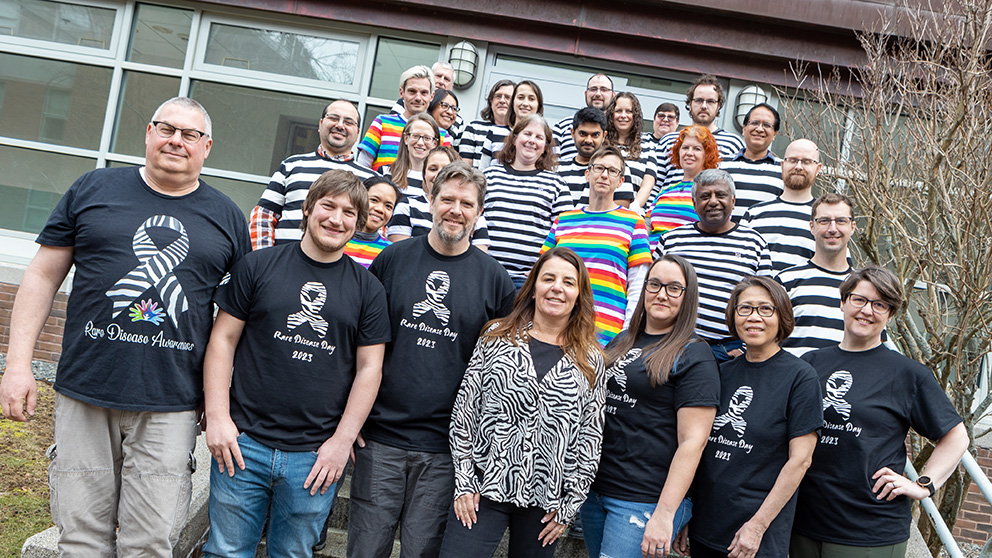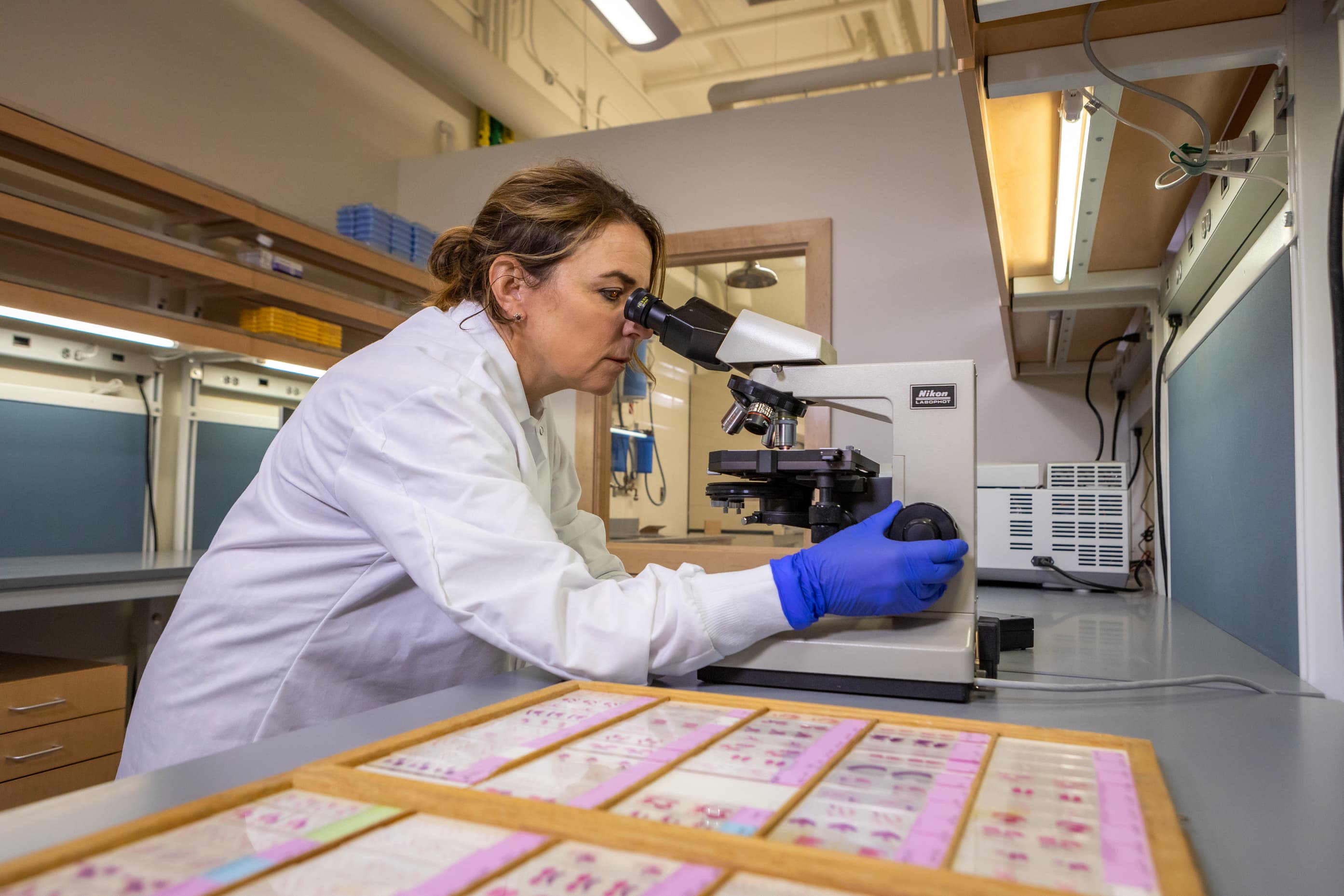Rare Disease Translational Center

Collaborate with the RDTC
Partner with us to provide patients with rare disease and families an efficient plan from diagnosis to therapy.
Learn more about our collaborations

Careers with the RDTC
Are you passionate about rare disease research?Apply now and join our growing team.
Your Premier Rare Disease Research Partner
Our team serves those with rare disease by accelerating the pre-clinical phase. Our vision is to provide patients with an efficient path from diagnosis to therapy, allowing them to live longer, healthier lives.
Our Mission
To empower rare disease solutions through partnership, innovation, and scaled pre-clinical pipelines, to deliver targeted therapies from lab to clinic swiftly and effectively.

The Rare Disease Translational Center’s Lead Programs
* Accepted into the Bespoke Gene Therapy Consortium
![]()
Your Platform
A mouse model is a foundational research platform to accelerate your preclinical research pipeline. Our team of scientists work closely with you to determine if a rare disease model exists and if it fits your therapeutic strategy. If no suitable model is available, our genetic engineers employ state-of-the-art technologies and strategies to effectively model patient variants. We aim to future-proof your model by designing it to be a tool to test a broad range of translational therapeutic approaches.
![]()
Your Pipeline
Our team of scientists work with you to craft preclinical pipelines with a focus on outcomes that translate directly to clinical practice. Our commitment to rigorous, robust, and reproducible research, positions your studies to be Investigational New Drug (IND) supporting. We are redefining the testing process to make high-quality preclinical work accessible and efficient by employing a parallel approach which, accelerate lead therapies to the clinic faster. This approach was the foundation for the successful clinical trials of Spinraza, the first FDA-approved drug for spinal muscular atrophy (SMA).
Design your preclinical platform
![]()
Your Partner
We collaborate with a diverse range of global entities, from families who have just received a diagnosis to biotech and pharmaceutical groups. As your partner, our research team not only executes your studies but also becomes an integral part of your scientific research team. We tenaciously tackle even the most complex research problems, drawing on decades of expertise in rare disease.
Our Stories

"Hope is what keeps moving you forward": JAX hosts the annual Rare New England Conference
Researchers from the Rare Disease Translational Center joined family members and…
Read More
Unravel Biosciences and The Jackson Laboratory announce collaboration
Unravel Biosciences and The Jackson Laboratory announce collaboration to accelerate the discovery of promising…
Read More
The Rare Disease Translational Center Attends the 2024 World Orphan Drug Congress
Join JAX RDTC Program Manager Paige Martin and Study Director Matt Simon as they take us through…
Read More
JAX receives $8 million in federal funding to expand research capacity in rare diseases
The funding will support construction of a dedicated facility for rare disease research…
Read More
Shedding light on common health challenges with rare disease research
In collaboration with Ohio’s Nationwide Children’s Hospital, JAX is testing a gene therapy for PGAP3-Congenital…
Read More
Spreading ALS awareness and changing patient outcomes
Members of the RDTC and Bar Harbor Preclinical Services participated in a walk to raise awareness for ALS.
Read More
Speeding the pace of rare disease research
The Rare Disease Translational center is driving the rare disease research pipeline.
Read More
Highlights and Takeaways from the 2023 NORD Summit
Representatives from JAX attended the 2023 National Organization for Rare Disorders Rare Diseases and Orphan Products Breakthrough…
Read More
New FDA-approved treatment for Friedreich’s ataxia patients
For the first time, there's an FDA approved treatment for Friedreich’s ataxia (FA). This is a major step forward for the FA…
Read More
The rare disease odyssey of the Panwala family
Parents of a child with INAD, a rare nervous-system disorder, partner with the JAX Rare Disease Translational Center to test therapies.
Read More
Bringing preclinical genome editing to the clinic
Supported by an NIH grant, Cat Lutz will lead a multi-institutional team to develop and validate new gene editing-based therapeutic…
Read More
Implementing gene therapies for rare diseases
A new consortium will positively impact rare disease patients and families and is a powerful and gratifying next step for those gene therapies …
Read More
Chan Zuckerberg Initiative grant will support rare neurological disorder research
A team including The Jackson Laboratory has received a $2 million grant to research the cause of…
Read More
JAX Rare Disease Translational Center strives to advance rare disease research
The Rare Disease Translational Center connects JAX to young patients and their families.
Read More
Battling SPG50 and changing how we treat rare diseases
Terry Pirovolakis and his family are going to the ends of the earth to create a treatment for his son Michael’s rare disease…
Read More
Cat Lutz named VP of Rare Disease Translational Center at JAX
Cat Lutz, Ph.D., M.B.A. was recently named vice president of the Rare Disease Translational Center at The Jackson…
Read More
How do you navigate the rare disease odyssey?
Rare disease families and experts offer advice on how to navigate the complicated and daunting journey from diagnosis to potential treatment.
Read More
Chris Brannigan to walk 1,200 miles barefoot for rare disease research
Chris Brannigan is preparing to take off his boots and walk nearly 1200 miles down the eastern seaboard of the…
Read More
Exposing the genetics of ALS
Amyotrophic lateral sclerosis (ALS) is a progressive neurodegenerative disease that affects nerve cells in the brain and the spinal cord. As of now, there is no…
Read More
JAX's Cat Lutz receives Rare Impact Award from NORD
Senior Director of JAX Rare and Orphan Disease Center, Cat Lutz, Ph.D., M.B.A. is honored for her tireless efforts in rare disease…
Read More
Help for the smallest and rarest
A JAX research team led by Cat Lutz launched a project to develop gene therapy strategies and to test small molecules for the treatment of multiple sulfatase…
Read More